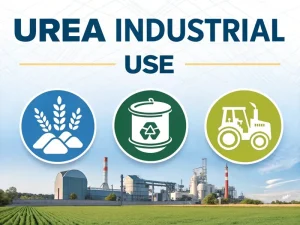
Urea Industrial Use
Tech Blog Urea Industrial Use When most people hear the word “urea,” they immediately think of fertilizer. While it’s true that over 90% of the


At present, there are three grades of urea on the market: Agricultural grade urea, Industrial grade urea and Automotive urea. Is there any difference between the different grades of urea?
Agricultural urea is one of the most widely used nitrogen fertilizers in the world. Its high nitrogen content and fast fertilizer effect, which can promote the rapid growth of crops, make it in great demand.

Whether it is agricultural or industrial urea, the main component is nitrogen, which is one of the three major nutrients needed for crop growth.
Theoretically, it will work as long as it can be effectively broken down and converted into ammoniacal nitrogen that crops can absorb. Although they are chemically similar, there are essential quality differences in how they each function.
One of the main concerns with industrial grade urea is the presence of biuret. Biuret is a by-product of the urea manufacturing process. In high concentrations, biuret can be toxic to plants. Agricultural grade urea is typically manufactured with strict controls to limit the biuret content to a very low level, usually less than 1%.
In contrast, industrial grade urea may have a biuret content that exceeds this threshold. When applied to crops, high biuret levels can cause leaf burn, stunted growth, and reduced yields. For example, in sensitive crops like citrus and some ornamentals, even a relatively small increase in biuret concentration can have a noticeable negative impact.
So, the conclusion is that despite the chemical similarities between industrial and agricultural urea, they are worlds apart regarding practical application. Agricultural urea is specifically designed for agricultural production, with high purity, few impurities, and a production process that considers crop uptake and utilization.
Industrial urea, without a strict screening and transformation process directly used in farmland, is likely to cause soil pollution, affect crop growth, and even jeopardize the safety of agricultural products.

Tech Blog Urea Industrial Use When most people hear the word “urea,” they immediately think of fertilizer. While it’s true that over 90% of the

Tech Blog How Is Urea Made for AdBlue AdBlue, the critical diesel exhaust fluid (DEF) for SCR systems, relies on high-purity urea (≥99.8%) as its

Tech Blog adBlue refractometer urea concentration testing AdBlue is the key to SCR (Selective Catalytic Reduction) systems, which rely on a precise 32.5% urea and

JINGJIANG MELAMINE POWDER
© JINJIANG MELAMINE